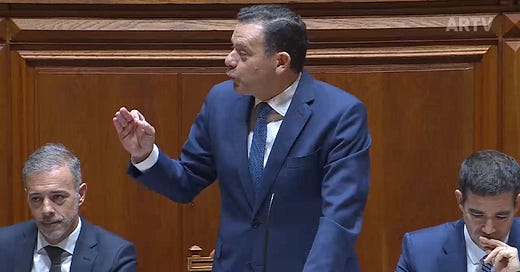PM Montenegro refuses to condemn Trump's Gaza plan
However, he assured that Portugal favours a solution in which Israel and Palestine can live in peace, and stressed that "any kind of ethnic cleansing" would be condemned.
Portuguese Prime Minister Luís Montenegro strongly condemned any form of “intervention, purpose, or intention of ethnic cleansing” in Gaza but refused to draw “rushed conclusions” regarding recent statements made by U.S. President Donald Trump.
During a parliamentary debate, Mariana Mortágua, leader of the Left Bloc (BE), pressed Montenegro on Trump’s reported plan for Gaza, which involves relocating Palestinians from the enclave.
Mortágua questioned whether the PM agreed with Defense Minister Nuno Melo, who earlier stated that commenting on U.S. internal politics was beyond his role.
Montenegro reiterated that Portugal’s stance on the issue remains “very clear,” affirming support for a two-state solution with both Israel and Palestine.
He rejected any tolerance for ethnic cleansing but emphasized the importance of careful analysis of international statements.
In response, Mortágua insisted that her language aligns with the United Nations and the International Criminal Court, arguing that international law supports her position.
She directly challenged Montenegro to condemn Trump’s statements, to which he replied: “I condemn any intervention, purpose, or intention of ethnic cleansing.:
Mortágua countered that this was a step forward, suggesting Montenegro would eventually have to acknowledge the reality of ethnic cleansing.
Key Parliamentary Debate Moments
Beyond the Gaza debate, Montenegro announced that the Council of Ministers would approve a reform of higher education regulations, ensuring greater autonomy for institutions.
He also stated that reductions in the Fuel Tax (ISP) would only occur if fuel price hikes became “unbearable.”
Regarding youth taxation, Montenegro acknowledged “injustices” in the youth personal income tax scheme but dismissed concerns over limiting early retirement reforms, affirming that any potential changes would be considered only in a future legislative term.
A heated exchange also occurred between Montenegro and Chega party leader André Ventura. Ventura accused the government of failing to act against politicians suspected of corruption, calling the PM “a liar,” while Montenegro countered that Ventura misrepresented facts for political gain.
The PM pointed out Ventura’s prior legal conviction for defaming the Coxi family, stating: “The door should have been shown to you.”
The debate also addressed the resignation of Hernâni Dias, former Secretary of State for Local Administration, over allegations of a conflict of interest related to the founding of two companies.
Montenegro admitted Dias had acted imprudently but stressed that his resignation was appropriate.
Ventura accused Montenegro of failing to act against officials under suspicion, to which the prime minister responded that Dias was not formally accused of any crime and that accusations against him were politically motivated.
Social security reforms were another major topic, with the opposition questioning whether the government planned to restrict early retirement. Montenegro refuted these claims, stating that any changes would only be discussed after future elections. He assured that Portugal’s social security system remains stable, citing a recent €4 billion transfer to the Social Security Stabilization Fund.
On healthcare, opposition parties criticized the government’s handling of public hospitals, particularly long waiting lists at the Amadora-Sintra Hospital and delays in pediatric oncology surgeries.
Montenegro acknowledged ongoing challenges in the National Health Service (SNS) but highlighted improvements in wait times and medical coverage.




